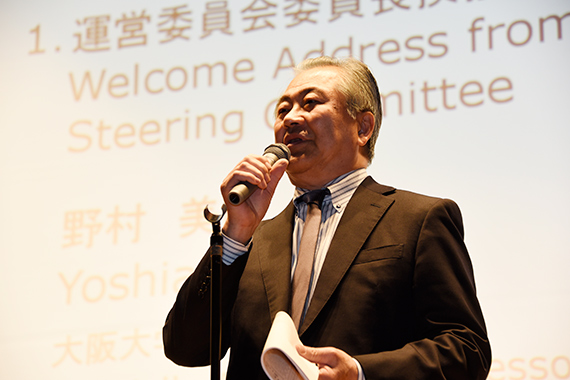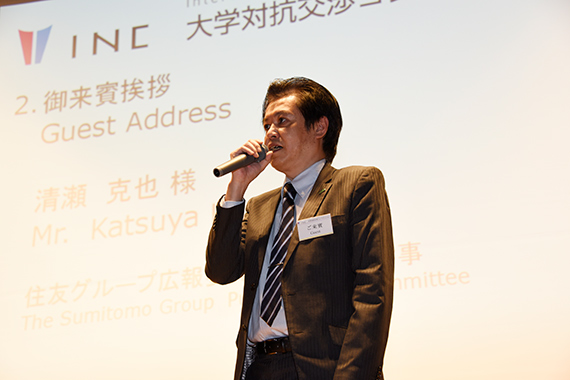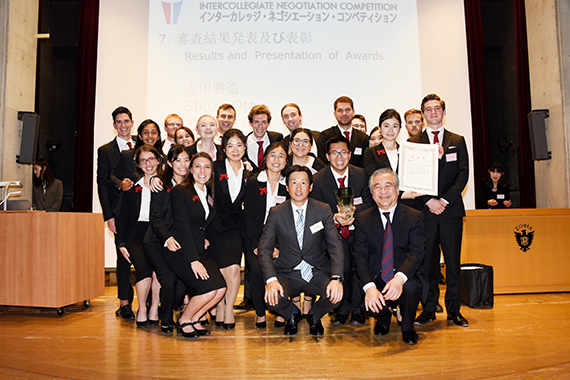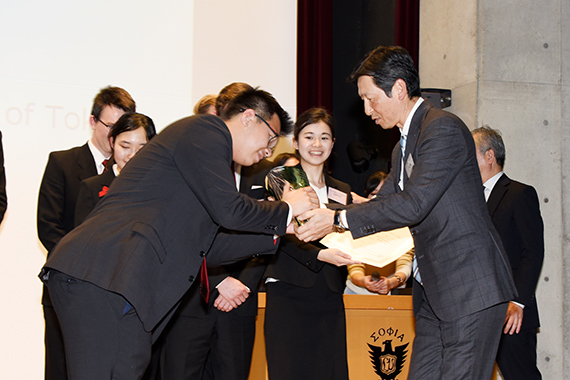Support for the Intercollegiate Negotiation Competition
The Sumitomo Group Public Affairs Committee strives to support college students’ negotiation skills, assist in upgrading higher education, and contribute to global human resources development through the Intercollegiate Negotiation Competition.
Intercollegiate Negotiation Competition website
17th (2018) Intercollegiate Negotiation Competition
On December 1 and 2, 2018, the 17th Intercollegiate Negotiation Competition (INC) was held at Sophia University in Tokyo.
The contestants were 271 students from 31 universities, with 36 teams competing in Japanese and 22 in English. 18 Japanese universities participated: Hokkaido University, Tohoku University, the University of Tokyo, Hitotsubashi University, Waseda University, Sophia University, Chuo University, Gakushuin University, Nihon University, Meiji University, Rikkyo University, Tsukuba University, Nagoya University, Kyoto University, Doshisha University, Ritsumeikan University, Osaka University, and Kyushu University. Participating from overseas were Team Australia (representing the Australian National University, the University of Sydney, the University of New South Wales, the University of Melbourne, Monash University, the University of Wollongong, the University of Queensland, the University of the Sunshine Coast, and the University of Technology, Sydney), the University of Hong Kong (HKU), the National University of Singapore (NUS), the National University of Mongolia (MUIS), and SolBridge International School of Business, South Korea.
Tournament chart
<Japanese>
|
Round A/arbitration |
Round B/negotiation |
| Red |
Blue |
Red |
Blue |
| 1 |
Kyoto |
Sophia 1 |
Team Australia |
Doshisha 2 |
| 2 |
Hitotsubashi 1 |
Doshisha 1 |
Meiji 2 |
Waseda 3 |
| 3 |
Ritsumeikan |
Waseda 1 |
Hitotsubashi 3 |
Tokyo |
| 4 |
Tohoku 1 |
MUIS |
Chuo 1 |
Nihon 1 |
| 5 |
Chuo 1 |
Waseda 3 |
Gakushuin 2 |
Osaka 2 |
| 6 |
Team Australia |
Waseda 2 |
Ritsumeikan |
MUIS |
| 7 |
Kyusyu |
Tokyo |
Tohoku 1 |
Doshisha 1 |
| 8 |
Gakushuin 1 |
Hokkaido 2 |
Kyusyu |
Tsukuba |
| 9 |
Rikkyo 1 |
Tsukuba |
Hitotsubashi 2 |
Hokkaido 1 |
| 10 |
Hitotsubashi 2 |
Sophia 2 |
Meiji 1 |
Hokkaido 2 |
| 11 |
Meiji 1 |
Osaka 2 |
Rikkyo 1 |
Osaka 1 |
| 12 |
Rikkyo 2 |
Nihon 1 |
Chuo 2 |
Sophia 1 |
| 13 |
Meiji 2 |
Nagoya |
Kyoto |
Waseda 1 |
| 14 |
Hitotsubashi 3 |
Osaka 1 |
Gakushuin 1 |
Nagoya |
| 15 |
Chuo 2 |
Hokkaido 1 |
Hitotsubashi 1 |
Nihon 2 |
| 16 |
Tohoku 2 |
Sophia 3 |
Rikkyo 2 |
Sophia 2 |
| 17 |
Meiji 3 |
Nihon 2 |
Meiji 3 |
Sophia 3 |
| 18 |
Gakushuin 2 |
Doshisha 2 |
Tohoku 2 |
Waseda 2 |
<English>
|
Round A/arbitration |
Round B/negotiation |
| Red |
Blue |
Red |
Blue |
| 1 |
Kyusyu 1 |
Waseda |
Team Australia 1 |
Nagoya 1 |
| 2 |
Team Australia 1 |
Osaka |
Kyusyu 2 |
SolBridge 2 |
| 3 |
Rikkyo |
Nagoya 2 |
Rikkyo |
Waseda |
| 4 |
Kyoto |
NUS |
Team Australia 2 |
Tokyo |
| 5 |
Team Australia 2 |
Hokkaido |
Hitotsubashi |
MUIS |
| 6 |
Kyusyu 2 |
Sophia |
Team Australia 3 |
Sophia |
| 7 |
HKU |
Tokyo |
Kyusyu 1 |
Hokkaido |
| 8 |
Hitotsubashi |
SolBridge 1 |
Meiji |
SolBridge 1 |
| 9 |
Meiji |
MUIS |
Kyoto |
Nagoya 2 |
| 10 |
Chuo |
Nagoya |
HKU |
Osaka |
| 11 |
Team Australia 3 |
SolBridge 2 |
Chuo |
NUS |
The Problem and the Competition Outline
The competition consists of two parts, Round A devoted to arbitration and Round B devoted to negotiation, with Japanese and English divisions for each part.
Teams discuss transactions as the protagonists of two fictional companies from fictional countries: Red Corporation of Negoland and Blue Corporation of Arbitria. Red is a major conglomerate and Blue is engaged in professional athlete management, athlete training and development, operation of sports channels, planning and implementation of sports events, etc.
In Round A on the first day, the teams acting as the counsels of the respective parties endeavored to resolve 1) β Case and 2) Event Case through arbitration. In Round B on the second day, the teams negotiated 1) provision of β-7 to Blue, 2) organizing of the Nego-Abu Cup, and 3) Red’s launch of a Negoland version of Blue’s Blue Sports Academy (BSA). In both Round A and Round B, contestants were well prepared and engaged in animated debate as if doing real business.
[Reference]
(Key points for Round A arbitration)
1) β Case
- Does Red have an obligation to provide the β-7series to Blue? The β-7 series has functions for collection and transmission of data on athletes’ movements, physical conditions and mental states to a mobile device without the athletes having to wear physical sensors.
2) Event Case.
- Red and Blue are to jointly organize a sports event (Nego-Abu Cup) in which athletes from Negoland where Red is based and Arbitria where Blue is based will compete.
- Three well-known athletes managed by Blue cancelled their participation in the event at short notice.
- Is Blue obliged to compensate Red for damages suffered as a result of their cancellation?
(Key points for Round B negotiation)
1) Provision of β-7 to Blue, which is Red’s latest sensor
- Should Red provide β-7 to Blue free of charge or for a fee? If for a fee, what should it be?
2) Second Nego-Abu Cup
- When should it be held: July or October?
- Sports: The two countries have agreed to hold games that include 15 sports (six have already been decided). Which sports should be included?
- Venues: Where should each sport be held?
- Governance by the steering committee: Should anything be improved from the previous setup? Should the steering committee have a chair?
- Sale of broadcasting rights: Which of the two groups should be approached?
3) Negoland version of the BSA by Red
- Blue’s cooperation
- Should the overseas training program for Negoland athletes interested in attending the BSA in Arbitria be enhanced?
Judges
Every year INC benefits from the cooperation extended by many people, including legal professionals, academics, and corporate legal staff. They serve as judges and provide commentary on the teams’ handling of the issues. For contestants, this feedback from the judges is both illuminating and stimulating, contributing to their personal development. Increasingly, judges and staff are drawn from the growing ranks of INC alumni.
Results of the 17th Intercollegiate Negotiation Competition
The awards ceremony always has an element of high drama. On the one hand, there is the delight of the winning team, and on the other hand, the disappointment of the runners-up. The drama attests to the commitment and enthusiasm of the contestants. The winners of the first prize were Team Australia. Ritsumeikan University won the Best Teamwork Award. The teams with the highest scores in the competition in Japanese were Team Australia for arbitration and Osaka University for negotiation. The teams with the highest scores in the competition in English were Chuo University for arbitration and Team Australia for negotiation.
| 1st prize |
Team Australia |
318.25 points |
| 2nd prize |
The National University of Singapore |
306.5 points |
| 3rd prize |
The University of Tokyo |
306.25 points |
| 4th prize |
Osaka University |
303 points |
| 5th prize |
Sophia University |
301.625 points |
| 6th prize |
Kyoto University |
301.5 points |
| 7th prize |
The National University of Mongolia |
299.75 points |
Best Teamwork Award
Ritsumeikan University
Highest score for the competition in Japanese for arbitration
Team Australia
Highest score for the competition in Japanese for negotiation
Osaka University
Highest score for the competition in English for arbitration
Chuo University
Highest score for the competition in English for negotiation
Team Australia

 EN
EN


